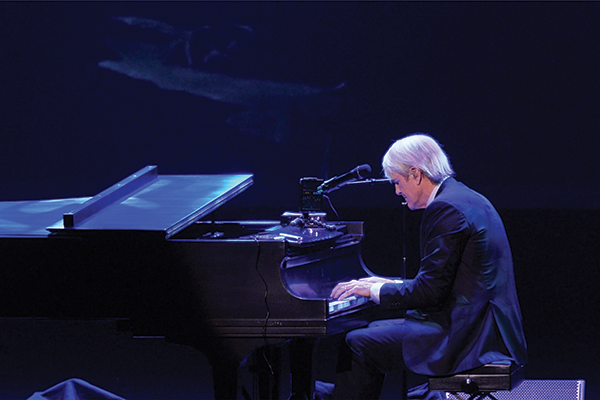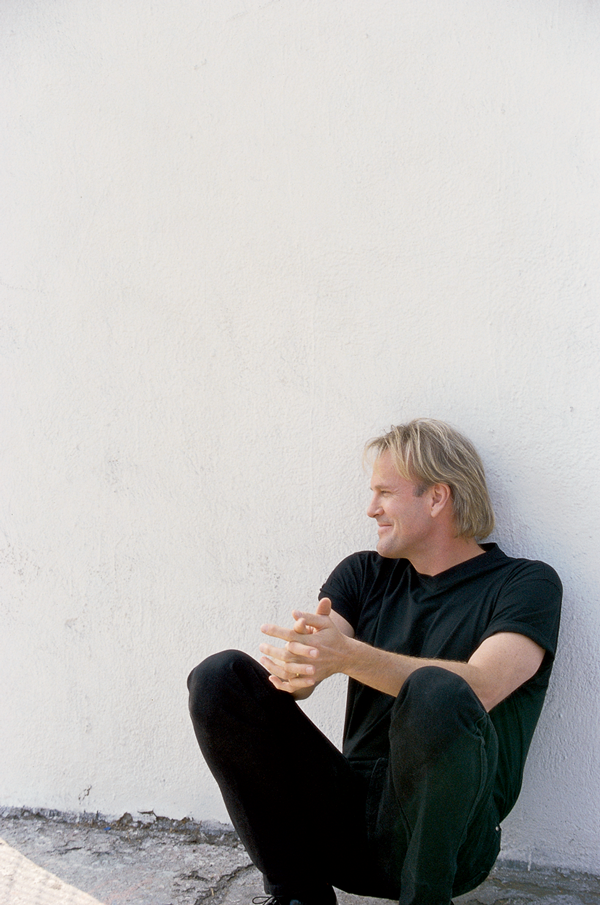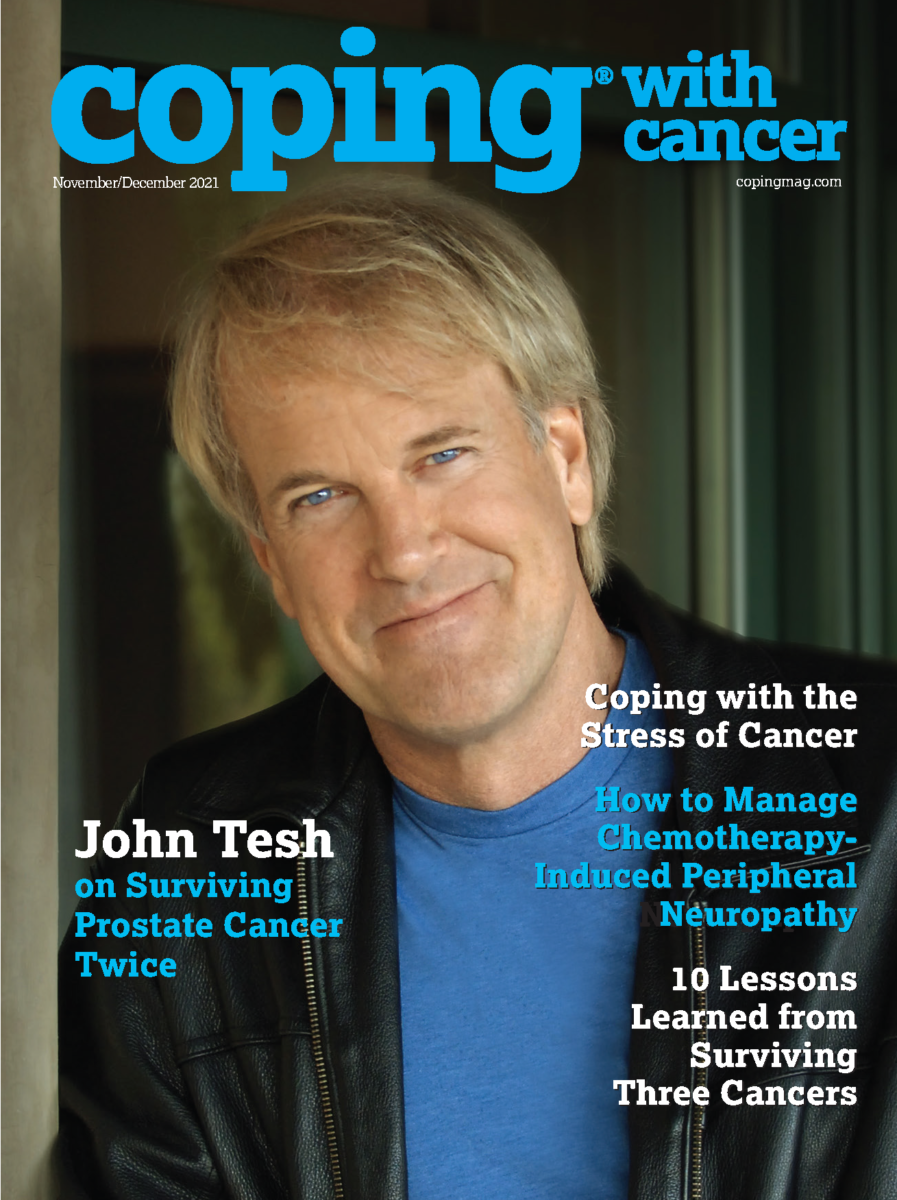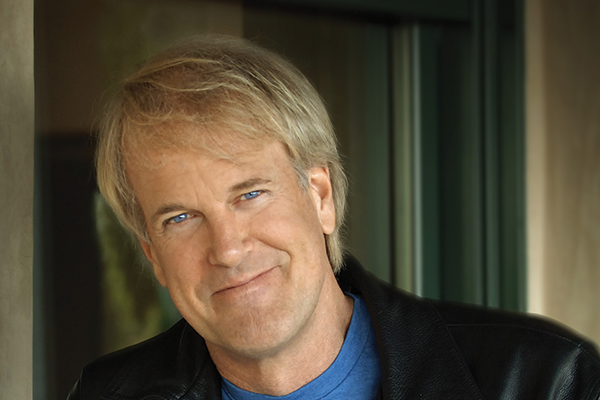John Tesh
on Surviving Prostate Cancer … Twice
by Ashley Hubbard
John Tesh is a versatile entertainer. His varied career includes stints as a cohost of Entertainment Tonight, composer, musician, radio personality, sports broadcaster, investigative reporter, news anchor, and author. Along the way, he’s racked up six Emmys, two Grammy nominations, four gold records, eight million records sold, and $7 million raised for PBS.
In 2015, he added one more title to the list – cancer survivor. At age 63, John was diagnosed with a rare form of prostate cancer and given only 18 months to live. Now, six years later, not only is John alive and well, but he is eager to share his story.
The Diagnosis
“I was sort of going merrily along in my life,” John says in a recent interview with Coping®, recalling the days leading up to his cancer diagnosis. “[I was] 63 years old, had two grandkids, and I had done some stuff in my life I was happy with.”
When he went in for his routine check-up, he appeared healthy. His bloodwork was good, and his PSA was in the normal range. His doctor was thorough, though, and insisted on doing a digital rectal exam. Something felt a little “off.”
John was sent to a urologist, then to get a sonogram, and finally a biopsy. The biopsy showed he had prostate cancer. It was aggressive. John and his wife, actress Connie Sellecca, were given the “get your affairs in order” speech from his doctor.
“I’m not a sick person trying to get well; I’m a healed person resisting sickness.”
Composing His Own Story
Though John says his doctor’s words were “pretty brutal,” he and Connie weren’t quite ready to accept this grim prognosis. Through his research, John came across a guidebook on surviving prostate cancer written by Dr. Patrick Walsh, who is considered a pioneer in the diagnosis and treatment of this disease. And, like a true investigative reporter, John tracked him down and grilled him on the treatment of aggressive prostate cancers like his.

John ultimately asked Dr. Walsh to operate on him. Regrettably, the doctor, who is now a professor of Urology, informed John that he had retired from surgery. However, he did set John up with a mentee of his at Johns Hopkins.
John and Connie’s relentless perseverance paid off. John underwent a complete prostatectomy performed by a surgeon he trusted. Things were looking up.
Until six months later, when cancer was found in his lymph nodes. This time, John needed chemo and androgen-deprivation therapy (also called ADT).

“All of a sudden, at 63 years old, I was basically a menopausal woman, probably times two or three,” John shares. “Night sweats, couldn’t sleep, couldn’t keep any weight on. Even to this day, my testosterone has still not recovered. It affects your energy.
“For someone who is [being treated for prostate cancer], it’s the ADT that is really life-changing. It causes a tremendous amount of depression.”
The Turning Point
“What happens when you’re told you have 18 to 20 months to live?” John asks rhetorically. “You start getting things. The paradigm changes, people are very kind to you, you go on these great vacations to the beach, you wake up whenever you want.
“I wasn’t in a lot of pain, and I didn’t need it, but I was taking Vicodin. I was taking Ativan. I had a medicine cabinet there. And I was drinking Scotch whisky to just sort of wash that stuff down.
“It was a bad time. I was a bad father. I was a bad husband,” John continues. “It was just bad. But my wife was terrific. She understood what I was going through, but she wasn’t going to tolerate my [pity party].”
“What happens when you’re told you have 18 to 20 months to live?“
Through her support, and the couple’s faith, John was able to turn things around and began to see an end in sight.
More from John Tesh
What would you want others who are battling cancer and depression to know?
Your depression, or your grief, or your suffering is your own. It’s very personal. You cannot inflate or deflate it in comparison to others’ suffering. It’s yours. There’s no grading it.
I saw this teaching about just imagining your life well, imagining yourself on the other side of it. Being able to see your future and then speak your future into existence, but also just asking yourself, If I didn’t have what I have right now [cancer], what would I be doing? Would I be scuba diving, would I be doing the radio show, would I be in the gym, would I be writing? It’s very hard, but if you can wrap your head around the mindset of doing what you normally would do, then you send the message to your subconscious mind that things are better for you.
Is there any other advice you would give people facing cancer?
I would say you have to have an action plan. The thing that really helped me every day was journaling.
The other thing is your advocate may not come from your family. I see many, many people whose family is just too busy, or it freaks them out, so the cancer survivor doesn’t end up with a good advocate. I think that we think our family will take care of us, but that doesn’t always happen. Understand that you’re going to need an advocate, and it doesn’t have to be your family. But you can’t do it all yourself.
Another Round
Then in October 2020, John began having horrible pains in his pelvis. Scans showed two large tumors, one wrapped around a kidney and one wrapped around his bladder. He would need to start treatment again. This time, oral chemotherapy and ADT. Within just a few weeks, John says the pain subsided and the tumors shrank.
“Now, I’m back in business. I still have some tumor tissue, and one of my kidneys is pretty much dead,” John explains. “But it hasn’t stopped me. I’m still going.”
John shares that one of the things that helped keep him going during his cancer battle was flipping the script on the way he talked about his illness. He says, “The way I started describing myself was, ‘I’m not a sick person trying to get well; I’m a healed person resisting sickness.’
“If you believe you’re healed in your spirit, then you can work on getting that in your flesh. There are a lot of people in that space that would never go to a doctor, but I learned the hard way that it should be a collaboration. That God wants you well, and that you need to collaborate with the people who He has blessed and who are smart enough to help you kill this disease.”

You can learn more about John at Tesh.com and follow him on Facebook (@JohnTesh) and on Instagram (@JohnTesh_ifyl).
This article was published in Coping® with Cancer magazine, November/December 2021.


